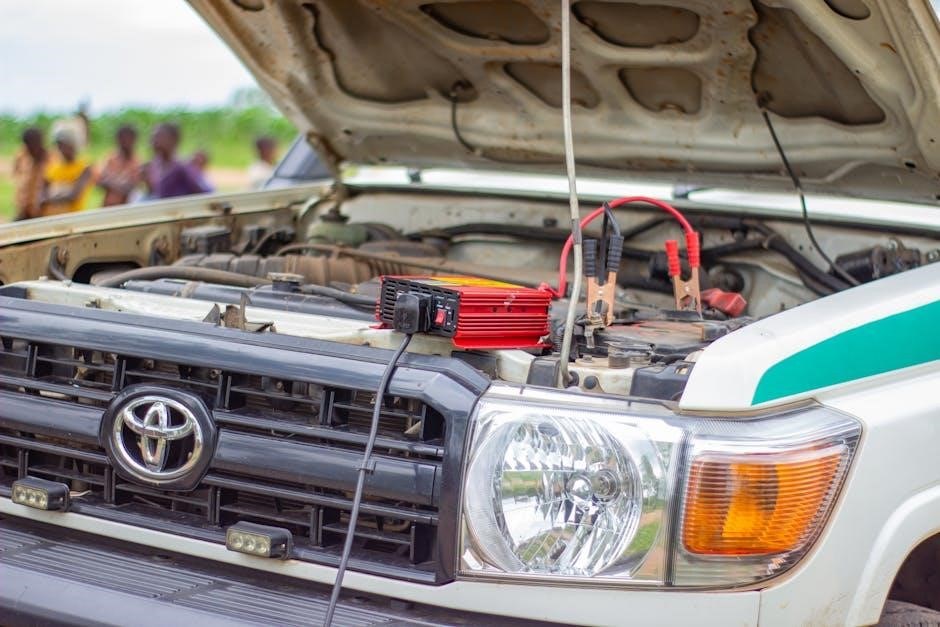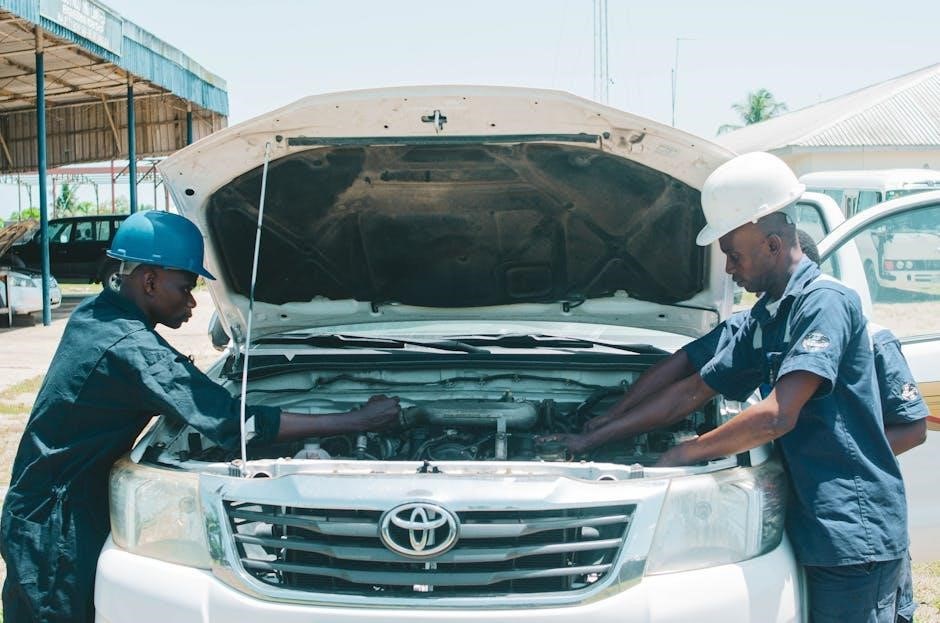The 2022 Toyota 4Runner maintenance schedule is designed to ensure optimal performance and longevity. Regular servicing at specified intervals guarantees safety, efficiency, and prevents costly repairs. Adhering to the recommended 5,000-mile intervals for oil changes and filter replacements, along with comprehensive checks, keeps your vehicle in peak condition.
Overview of the Importance of Regular Maintenance
Regular maintenance is crucial for ensuring the 2022 Toyota 4Runner operates at peak performance, safety, and efficiency. It prevents unexpected breakdowns, extends vehicle longevity, and maintains its value. By following the recommended schedule, owners can address minor issues before they escalate, reducing repair costs. Proper upkeep also ensures compliance with warranty terms, safeguarding against potential liabilities. Regular servicing enhances fuel efficiency, reduces emissions, and maintains optimal drivability. Adhering to Toyota’s guidelines ensures all components function as intended, providing a reliable and enjoyable driving experience. Consistent maintenance is an investment in the vehicle’s health and the owner’s peace of mind.
Key Mileage Intervals for Scheduled Services

The 2022 Toyota 4Runner maintenance schedule outlines specific mileage intervals to ensure timely servicing. At 5,000 miles, oil changes and filter replacements are essential. By 15,000 miles, tire rotations and fluid checks are recommended to maintain performance. At 30,000 miles, a more comprehensive service is required, including inspections of belts, hoses, and brakes. These intervals are designed to address wear and tear proactively. Adhering to this schedule ensures optimal vehicle performance, prevents unexpected issues, and extends the lifespan of the 4Runner. Regular checks at these key milestones are vital for maintaining reliability and safety on the road.
Detailed Maintenance Schedule Breakdown
The 2022 Toyota 4Runner maintenance schedule provides a comprehensive overview of services required at specific intervals to ensure optimal vehicle condition and performance throughout its lifespan.
5,000-Mile Service Interval Requirements
The 5,000-mile service is a critical checkpoint for the 2022 Toyota 4Runner. It includes an oil change with a genuine Toyota filter replacement to maintain engine health. Tire rotation is also performed to ensure even tread wear and improve handling. Brake pads, rotors, and drums are inspected for wear, alongside belts and hoses for signs of cracking or damage. Fluid levels, including coolant, transmission, and differential fluids, are checked and topped off as needed. Additionally, the air filter is inspected, and the vehicle’s suspension, steering, and exhaust systems are evaluated for any issues. This interval also includes a visual inspection of the vehicle’s exterior and interior components for proper function and integrity.

15,000-Mile Service Interval Requirements
At the 15,000-mile mark, the 2022 Toyota 4Runner requires more extensive maintenance to ensure continued reliability. This service includes a thorough inspection of belts, hoses, and other critical components for signs of wear or damage. The air filter and cabin air filter are replaced if necessary, and the battery is tested for optimal performance. Brake systems are evaluated, and the suspension and steering components are checked for proper alignment and function. Additionally, fluid levels, including coolant, transmission, and differential fluids, are inspected and replenished as needed. This interval also involves a detailed examination of the exhaust system and undercarriage for any potential issues, ensuring the vehicle remains in excellent condition for the next phase of its maintenance cycle.
30,000-Mile Service Interval Requirements

The 30,000-mile service for the 2022 Toyota 4Runner is a critical checkpoint for long-term vehicle health. At this interval, spark plugs are typically replaced to ensure proper engine performance and fuel efficiency. The drive belts and hoses are inspected for signs of cracking or wear, and the cooling system is checked for leaks or blockages. Additionally, the transmission and differential fluids are inspected and replaced if necessary to maintain smooth operation. Brake pads and rotors are evaluated for wear, and the exhaust system is examined for leaks or damage. This service also includes a detailed inspection of the suspension and steering components to ensure proper alignment and function, helping to prevent premature wear and maintain optimal vehicle performance.
Essential Maintenance Services for the 2022 Toyota 4Runner
Regular oil changes, tire rotations, and component inspections are vital. Fluid checks, filter replacements, and spark plug maintenance ensure optimal performance and extend vehicle longevity.
Oil Change and Filter Replacement Guidelines

Regular oil changes are critical for the 2022 Toyota 4Runner. Toyota recommends synthetic 0W-20 oil for optimal performance. Oil and filter replacements should occur every 5,000 miles to maintain engine health. Using genuine Toyota parts ensures compatibility and longevity; Neglecting this can lead to engine damage and reduced fuel efficiency. Always refer to the owner’s manual for specific guidelines. Proper disposal of used oil and filters is essential for environmental protection. Scheduled oil changes also provide opportunities for technicians to inspect other components, ensuring overall vehicle reliability. Adhering to these guidelines helps maintain your 4Runner’s performance and warranty validity.
Tire Rotation and Pressure Checks
Regular tire rotation and pressure checks are vital for the 2022 Toyota 4Runner. Tire rotation should occur every 5,000 to 8,000 miles, following the rearward cross pattern. Proper tire pressure, typically 35-40 PSI, enhances safety, fuel efficiency, and handling. Check pressure monthly and before long trips using a reliable gauge, not just the TPMS. Neglecting these can lead to uneven tread wear, reduced efficiency, and increased risk of tire failure. Adhering to these guidelines ensures optimal performance and longevity, especially for those who tow or drive off-road. Always refer to the owner’s manual for precise specifications.
Inspection of Vehicle Components
Regular inspection of vehicle components is crucial for maintaining the 2022 Toyota 4Runner. At every 5,000-mile service interval, technicians inspect belts, hoses, and fluid levels to ensure proper function. Brake pads, rotors, and suspension components are also examined for wear. Tires are checked for tread depth and uneven wear, while the exhaust system is inspected for leaks or damage. Battery health, including charge and connections, is evaluated to prevent unexpected issues. These inspections help identify potential problems early, preventing costly repairs and ensuring reliable performance. Consistent checks maintain safety, efficiency, and overall vehicle integrity, aligning with Toyota’s commitment to durability and driver satisfaction.

Additional Recommendations for Extended Vehicle Life
For prolonged durability, ensure timely fluid checks and replenishment, and consider spark plug replacements at recommended intervals. These steps enhance performance and prevent premature wear.
Fluid Checks and Replenishment
Regular fluid checks are essential for maintaining the 2022 Toyota 4Runner’s health. Engine oil, coolant, transmission, and brake fluids should be inspected at every service interval. Low levels or contamination can lead to serious damage. Toyota recommends using genuine fluids to ensure compatibility and performance. During each maintenance visit, technicians will evaluate fluid conditions and top them off as needed. Additionally, fluid replacements are scheduled at specific mileages to prevent degradation. Adhering to these guidelines ensures optimal lubrication, cooling, and functionality of critical systems, thereby extending the vehicle’s lifespan and maintaining its reliability on and off the road.

Spark Plug Replacement Intervals
Spark plug replacement is crucial for maintaining the 2022 Toyota 4Runner’s engine performance. Toyota recommends replacing spark plugs every 120,000 miles to ensure proper ignition and fuel efficiency. Using high-quality platinum or iridium spark plugs, as specified by Toyota, ensures longevity and optimal engine function. Regular inspections during scheduled maintenance can help identify worn-out plugs before they cause issues like misfires or reduced power. Timely replacement prevents damage to the engine and maintains smooth operation. Always refer to the official Toyota maintenance schedule for precise intervals and guidelines to keep your 4Runner running at its best.

Warranty Coverage and Owner Responsibilities
Toyota’s warranty covers repairs and replacements for defects in materials and workmanship. Owners must adhere to the maintenance schedule to ensure warranty validity and avoid coverage denial;
Understanding Toyota’s Warranty Terms
Toyota’s warranty for the 2022 4Runner provides coverage for repairs and replacements due to defects in materials or workmanship. The warranty applies to vehicles sold through authorized dealers in the U.S. and is divided into basic and powertrain coverage. The basic warranty typically covers most components for 3 years or 36,000 miles, while the powertrain warranty extends to 5 years or 60,000 miles. Tires and batteries may have separate coverage periods. Wear and tear items, such as brakes and wipers, are not included. Proper maintenance, as outlined in the schedule, is essential to maintain warranty validity. Owners should review the warranty manual for full terms and conditions.
Owner’s Role in Maintaining Warranty Validity
Owners play a crucial role in maintaining the validity of their 2022 Toyota 4Runner’s warranty. Adhering to the recommended maintenance schedule is essential, as failure to do so may result in denied claims. Regular servicing, such as oil changes and inspections, must be performed by qualified technicians using genuine Toyota parts. Owners must also keep detailed records of all maintenance activities, including dates, mileage, and services performed. Addressing any issues promptly and following Toyota’s guidelines ensures warranty coverage remains intact. Neglecting scheduled maintenance or using non-approved parts can void the warranty, leaving owners responsible for repair costs. Proper care and adherence to Toyota’s requirements safeguard both the vehicle’s performance and warranty benefits.
